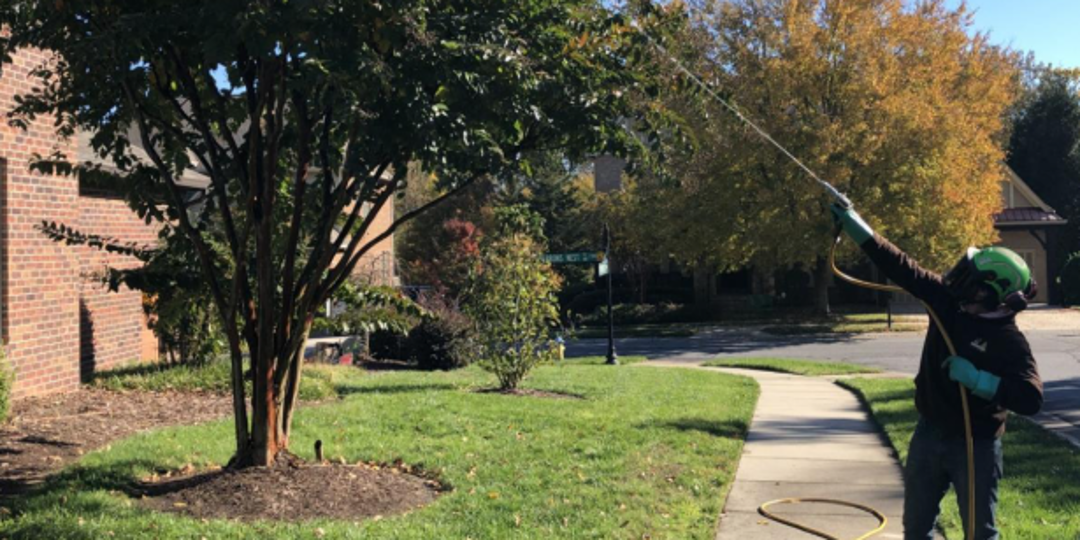As many trees - and the pests that afflict them - fall silent in cooler weather, fall and winter are often seen as downtimes for plant health care. However, it is for this very reason that this time of year can be one of the most critical windows of opportunity to gain an upper hand on many potentially damaging pest populations. In this article we will take a look at a holistic pest control product known as horticultural oil. This is an invaluable tool utilized by Monster Tree Service’s expert arborists for fall and winter plant health care that not only gives your trees an upfront advantage against damaging pests - but also lends a hand to protect the environment and lower the use of more toxic controls on your trees and property.
What are horticultural oils?
Horticultural oils are either petroleum or plant-based formulations that are diluted in water and sprayed on the leaves, branches, and bark of trees. They control many damaging insect pests, as well as curb or prevent a number of harmful plant disease pathogens. Their use can be traced back many centuries, and today horticultural oils are valued by arborists for their ability to protect trees and woody plants while minimizing harm to beneficial insects, wildlife, and the environment.
Horticultural oil is a strategic weapon that’s hard on pests but non-toxic to the environment - and your yard.
Horticultural oils create a powerful barrier against insect pests and many fungal diseases. The way that they work, called their “mode of action”, occurs through a physical rather than chemical process, which makes horticultural oils an effective solution for combating pests without causing them to build up a chemical resistance. This presents a potent option that can be used repeatedly and for a longer period of time than other chemical controls. An added benefit of horticultural oils is their ability to eliminate target pests without the added risk of residual toxicity that occurs with many other harsher control products.
The efficacy of horticultural oils varies with the type of insect, the stage of its lifecycle, and the time of year when the product is applied. In the case of active insects, they block the air exchange pores – called spiracles – located along the insect’s exoskeleton that allows them to breathe, essentially smothering and suffocating targeted pests.
Horticultural oils also work by penetrating the waxy cuticles of insects and mites - interacting with their fatty acids, which then interferes with normal metabolism and internal functions that are needed for survival. This mode of action is especially valued for armored insects such as scale insects, as well as spider mites which tend to be impervious to other chemically active insecticides. Especially when mixed in heavier cool season concentrations, horticultural oils are also effective against the egg and winter stages of these troublesome pests. This makes them an especially valuable tool for strategic IPM practices targeted to prevent and curb future pest outbreaks.
A powerful tool against tree and plant diseases
Another side benefit to horticultural oil is control of the unsightly sooty mold that results from the honeydew excreted by many sap feeding insects. And on its own, horticultural oil also directly attacks some fungal pathogens such as powdery mildew by disrupting the cell walls of fungal filaments and spores that transmit the disease.
In addition, horticultural oils also offer an indirect benefit of controlling diseases that are vectored by many problematic sap feeding insects. Through their feeding action these pests frequently transmit viruses, bacterial pathogens, or other toxins, so controlling these pests can act as an effective means to prevent many debilitating tree and plant diseases.
Fall and late winter is an especially good time to apply horticultural oil.
Horticultural oil can be applied during most times of the year, provided that temperatures do not drop below freezing or exceed 90 degrees. However, fall and late winter offer an especially ideal opportunity to launch an offensive on troublesome pests at a time when they are least active. Other advantages of cool weather applications include:
Cool weather winter or “dormant” oils are heavier in weight than summer oils, so they take longer to dissipate. Therefore, they cover pests for longer periods of time and are more highly effective.
When trees are bare, fall and winter applications can prevent plant injury, discoloration or other phytotoxicity issues that may occur at other times of the year.
Dormant oils are effective on multiple life stages of overwintering pests, killing overwintering insects and their eggs.
Fall and winter applications prevent future infestations, and controlling pests during the dormant season significantly reduces populations that would potentially cause damage in the spring and summer.
Monster’s commitment to tree health, the environment, sustainability - and your family’s safety
Monster Tree Service is committed to preserving the health of trees, integrating sustainable products and responsible application practices that effectively target pests while protecting the environment. Our fall and winter plant health care treatments include a holistic plant-based horticultural oil that features a specialty blend of high quality, organically sourced, botanical oils and extracts. By utilizing natural ingredients, these oils offer an effective and environmentally friendly solution that supports healthy trees and plants while respecting the overall balance of the ecosystem that surrounds them - keeping your property safe for your family, pets, and outdoor activities.

